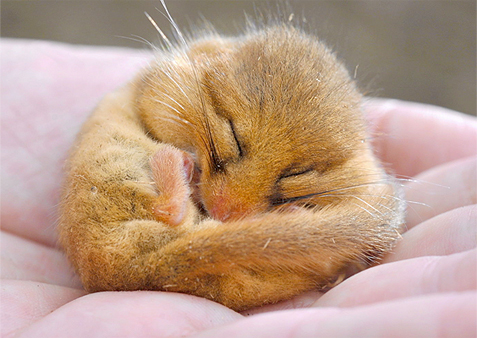Slapende slaapmuis gered
 Soms gaat er ook nog wel eens wat goed in de wereld. Zo werd deze slapende muis (grote foto Credit: REX/Brunopress), een week of wat geleden gered van een wisse dood. Het beestje werd opgeharkt door een onoplettende harker. Maar bleef ondanks deze aanslag op zijn winterslaap toch keurig doorslapen. Gelukkig ook maar. Want zou 'ie te vroeg wakker worden, dan had het beestje moeite gehad met het vinden van lekkere besjes, noten en andere dingen die hij zo al eet. Hieronder het volledige verhaal. Veel leesplezier!
Soms gaat er ook nog wel eens wat goed in de wereld. Zo werd deze slapende muis (grote foto Credit: REX/Brunopress), een week of wat geleden gered van een wisse dood. Het beestje werd opgeharkt door een onoplettende harker. Maar bleef ondanks deze aanslag op zijn winterslaap toch keurig doorslapen. Gelukkig ook maar. Want zou 'ie te vroeg wakker worden, dan had het beestje moeite gehad met het vinden van lekkere besjes, noten en andere dingen die hij zo al eet. Hieronder het volledige verhaal. Veel leesplezier!A hibernating dormouse curls up in the palm of a hand blissfully unaware it has been rescued from a back garden. The tiny animal can be only be handled for a few seconds at a time because otherwise the warm touch of human skin could cause it to wake prematurely.
Dormouse expert Dave Williams saved the three-inch creature from death after it was unwittingly exposed to frost, wind and rain. It was left in the perilous condition when a gardener accidentally raked its woven grass nest from under a hedge. If left alone, the freezing temperatures could have killed the tiny creature or it could have struggled to find the seeds, nuts and berries to eat if woken early.
When Mr Williams was alerted to its predicament, he rescued the mouse and checked that it was ok. He said: "A gardener was cutting back a box hedge when they noticed this tight ball of grass on the ground. "They had seen a dormouse earlier in the year by their compost heap and suspected it may be a nest so they covered it with cuttings and called me. "The mouse was healthy but it was too exposed and I was not prepared to leave it".
While it continues to hibernate, the mouse will now be looked after at Wildlife Aid in Surrey. Mr Williams added: "I had to handle the mouse to check it was healthy but you can only touch it for about 30 seconds at a time. "If it gets too hot it could trick the mouse into thinking spring has come and it will wake from hibernation. "That is not too serious at the wildlife sanctuary because we can feed it but in the wild it would struggle to find food this early in the year".
